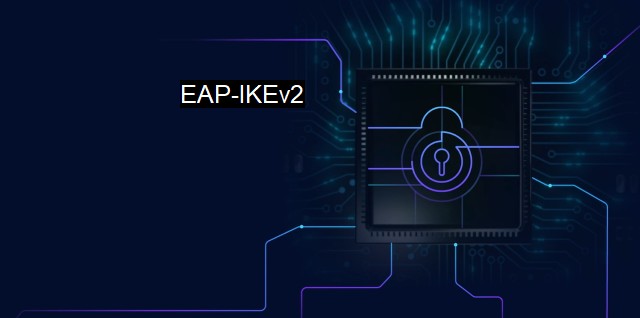What is EAP-IKEv2?
EAP-IKEv2: A Robust Protocol for Enhancing Cybersecurity Through Extensive Authentication Methods
EAP-IKEv2, or Extensible Authentication Protocol-Internet Key Exchange version 2, combines capabilities of Internet Key Exchange (a protocol suite for creating and managing security associations) and the Extensible Authentication Protocol (a universal protocol for authentication). It is an authenticated key exchange system that enables two machines to establish symmetric encryption keys for data protection. EAP-IKEv2 operates under the foundation of cybersecurity, playing an integral role in secure authentication and invulnerable data transmission via digital networks.EAP-IKEv2 offers a reliable solution for secure remote access, particularly in environments where virtual private networks (VPNs) are routinely used. VPNs form an essential security stalwart for both businesses and individuals, creating secure connections over the internet. They use encryption to protect data from potential hacking attempts and maintain privacy. When a user tries to establish a VPN connection, certain protocols perform user verification. EAP-IKEv2 is a popular authentication protocol for ensuring the security of connection establishment for VPNs.
EAP-IKEv2 revolves around mutual authentication methods and robust encryption key establishments. It supports the ideal objectives of modern security standards by providing integrity protection, replay protection, and confidentiality. The crucial feature of EAP-IKEv2 is its built-in mobility and multihoming function, perfectly meeting the needs of devices that switch between different types of internet connections. Therefore, it is widely used today, particularly in mobile VPN solutions.
To understand how EAP-IKEv2 functions in securing data transmission, it is fundamental to comprehend the IKEv2 protocol – the most significant part of EAP-IKEv2. IKEv2 is a protocol that streamlines the security association process. It establishes secure connections, negotiates security policies, and manages cryptographic keys in a secure environment. Its reliable and efficient design minimizes connectivity interruptions risks, making it suitable for maintaining consistent connections across a mobile network.
The application of EAP-IKEv2 operates within the realms of IPsec suites, a collection of protocols used to secure Internet Protocol (IP) communications. With IKEv2 providing authentication at the IP layer, this technology offers versatility and is ideal for securing wireless connections, especially useful with the prevalence of Wi-Fi connections in commercial and personal spaces.
It is important to note that while EAP-IKEv2 indeed preserves data integrity and confidentiality during transmission, the use of a trustable anti-virus solution is crucial. Notwithstanding the encryption might protect against data hijacking during transit, malware and viruses can hide in decrypted data within the endpoint device itself. Antivirus software provides an extra layer of protection after the traditional cybersecurity defense line – firewalls.
Antivirus scans and eliminates potential threats in the decrypted data, preventing the spread of any malicious software. Interacting synergistically with security protocols like EAP-IKEv2, it helps keep devices secure against a broader range of network security threats. Together, they form comprehensive cyber defenses – each handling a different aspect of cyber threat management. While authentication protocols such as EAP-IKEv2 aim to securely transmit data across networks, antivirus platforms target potential threats housed within computer systems, scanning files and programs for harmful software.
EAP-IKEv2 stands as a leading force in advancing secure and reliable networks, lessening vulnerabilities and establishing secure connections. While it toils to ensure the safe transmission of data across different networking environments, its combined use with reliable antivirus systems cultivates a broader security landscape – working towards a consistently safe cyber environment. Its robust and efficient design, reliable mobility support, and powerful security measures make it a substantial asset in today's cybersecurity world. Despite the evolution and increase of cyber threats, protocols like EAP-IKEv2 demonstrate the tech world's capacity to respond, innovate and secure.

EAP-IKEv2 FAQs
What is eap-ikev2 and how does it relate to cybersecurity?
EAP-IKEv2 (Extensible Authentication Protocol-Internet Key Exchange version 2) is a security protocol used for authentication and key management in VPN (Virtual Private Network) connections. It provides secure and reliable communication between client and server, enhancing the cybersecurity of VPN communication.What are the benefits of using eap-ikev2 in VPN connections?
EAP-IKEv2 provides a number of benefits for VPN connections, including strong authentication, robust key management, and support for various encryption algorithms. It also supports seamless roaming between different networks, making it ideal for mobile devices. Additionally, it is resistant to attacks such as Denial of Service (DoS) attacks and provides protection from man-in-the-middle attacks.What role does eap-ikev2 play in antivirus software?
EAP-IKEv2 does not directly relate to antivirus software, as it is a security protocol used for VPN connections. However, antivirus software may use VPN connections to protect a user's internet traffic from malware and other threats. In this context, eap-ikev2 would enhance the security of the VPN connection, which would in turn enhance the overall security of the antivirus software.Can eap-ikev2 be used for other applications besides VPN connections?
EAP-IKEv2 is primarily used for VPN connections, but it can also be used for other applications that require secure authentication and key management. For example, it can be used for secure email communication, file sharing, and remote desktop access. However, it is important to note that eap-ikev2 may not be appropriate for all applications and should be used in accordance with best practices for secure communication.Related Topics
VPN authentication protocols digital certificates cyber threats encryption algorithms
| | A | | | B | | | C | | | D | | | E | | | F | | | G | | | H | | | I | | | J | | | K | | | L | | | M | |
| | N | | | O | | | P | | | Q | | | R | | | S | | | T | | | U | | | V | | | W | | | X | | | Y | | | Z | |
| | 1 | | | 2 | | | 3 | | | 4 | | | 7 | | | 8 | | |||||||